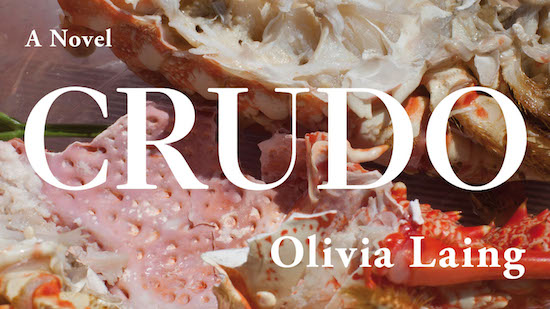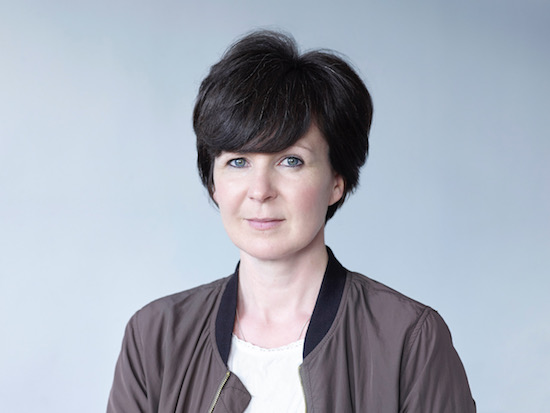It is a uncommonly hot, searing bright, afternoon in the piazza outside the British Library, and Olivia Laing is wearing sunglasses, wondering whether it’s too early for a beer. It isn’t. As we talk under a parasol, surrounded by tourists and researchers fleeing the dark of the book stacks, sipping from bottles, the sunglasses seem strangely apt: they provide distance and a whiff of disguise, much like the narrator of Crudo – her beguiling, wise and singular debut novel – is both Laing, and not Laing at all.
Taking place over the course of seven summer weeks in 2017, Crudo is the story of Kathy, a just-turned-forty writer, who’s about to be married for the first time. Kathy shares the particular circumstances of Laing’s life – she got married for the first time in 2017 – but also the biography and writing of counter-cultural icon Kathy Acker, whose writing is regularly embedded in the prose.
“The point of the book,” Laing says, “is to fuse these two people to see what happens and try to capture what that feels like from a cartoonish version of me. That’s the joke.”
It’s a high-wire act, one that could easily seem tricksy, self-consciously meta, or just plain irritating; but Laing’s Kathy is a fully realised, wholly believable woman: intoxicated with love, despairing of the violence of the new world around her. The tension between the everyday and the historically extraordinary, between the tenderness of love and the barbarity of modern political action, is deftly expressed, in turns furious, and furiously funny. It is a gloriously contemporary novel, but one that seemed unlikely. Laing is the author of three award-winning, innovative works of non-fiction – To the River, The Trip to Echo Springs, and The Lonely City – and always said she wouldn’t write a work of fiction. So what changed?
“I was reading and reviewing the Chris Kraus biography of Kathy Acker,” she says, “and she had this really brilliant thing at the beginning about Kathy Acker starting to write. She was taught by David Antin, the experimental poet, and they would go to the library and pick up books, bring them back and put what they found in the first person. She started doing this and would take out a biography of Toulouse Lautrec’s and copy it out word for word, but using I [rather than the third person], and turn it into a new work.
“I was really blocked on a non-fiction book and couldn’t get purchase on what I was trying to write. The intensity of the political situation was changing so fast, it felt like I couldn’t get a proper vantage point. So there was something about this idea of appropriating a world that appealed to me. I thought, what if I just appropriate now, but I do it from a voice that is Kathy Acker? What would happen? It was just a game for myself, at first. What would happen if I did that? It turned out to be this way that I could write about what was going on, and what I thought about it… I always said I wouldn’t write fiction – but I couldn’t possibly do anything with non-fiction that approached that speed. So it had to use some sort of tools of fiction to be fast enough.”
Speed crops up several times in our conversation – the speed with which one writes, the pace of change in the world, the time it takes to finish a book and then publish it – and it is still surprising to read a novel which includes events that happened less than a year ago. For someone who “agonises over every sentence” and whose work is so research intensive, how did Laing manage it?
“I wrote it in seven weeks and had a rule that I had to write every day and I wasn’t allowed to edit. So it’s basically unedited. When I did decide to publish it – which I wasn’t first of all: I was just going to put it on the internet, or maybe do a hundred of them and give them to friends, it wasn’t written with the intention of publication – I was very controlling about it: they had to publish within a year of it [being delivered]. So the whole thing has moved very fast. …It was a complete dream to be able to write at that sort of speed, to make it that feverish, it felt so much like an imprint of the times we were in.”

“An Imprint of the Times” could work as a subtitle for Crudo: while the book was written in seven weeks, you can feel a lifetime’s engagement with the political and emotional temperatures underpinning the narrative shenanigans (It put me in mind of the apocryphal story about Picasso being asked by someone in a café to doodle something on a napkin. Dutifully, Picasso swiftly sketches on the napkin, but refuses to hand it over to the man unless he pays a huge amount of money. The recipient balks at the price. “How much?” he says. “It only took you a minute.” Picasso shakes his head. “No,” he says, “that took me forty years.”). It is effortless, and affecting, with a voice that perfectly articulates both a personal and political upheaval.
“I wanted to get what it’s like to live an ordinary life with ordinary tenderness and domesticity … but at the same time watching hells unfold for so many people, and being not completely powerless, but semi-powerless, and constantly facing news that’s so shocking and so graphic. Everyone I know was having that experience, that you could log in to Twitter in the morning and you could watch a lynching, and then you’d see your friends making jokes and the two together … felt like what our world had become, what our world wasn’t two years before.”
Laing is a persuasive, ebullient and unsurprisingly engaging interviewee. Our conversation wanders over Incels, gender politics, the social privations and freedoms afforded by technology, the novel A Box of Matches by Nicholson Baker (“Perhaps a subterranean influence on Crudo”), the re-publication of the work of American writer, artist and activist David Wojnarowicz (for which Laing can claim substantial credit after her championing of him in The Lonely City), AIDS activism, the longevity of American right-wing politicians, Princess Diana’s understanding of the publication process, and how much of one you should put into a work of non-fiction.
We come to this last point as we are finishing our beers; our last, as it turns out, as the bar has already closed without us noticing. Did she find the novel more exposing than her works of non-fiction?
“I hadn’t read anything about what happens in your first weeks of marriage, apart from happily ever after. And actually, it involved a lot more sort of internal and external turbulence than I was expecting – and that seemed like a fun thing to write. This is very exposing as many of the tantrums Kathy has are my own tantrums, and I just think who cares? If this reports badly back on my character, it has truth. Kathy is a character and is this cartoonish character, but there are elements of truth in her … it felt fun and exciting to me to tell tales on my worst aspects.
“In some ways she’s a ridiculous character, in some ways she’s a hateful character, but also she’s really human. Kathy’s not very fucking nice, but she wants to be. Who cares about nice people? It’s the struggle to be better than you are that is much more interesting to me than how pious you are.”
It is a struggle that Crudo explores with depth, wit and moments of exquisitely wry irony; a struggle that encapsulates Laing’s belief that “personal actions are political actions”. Kathy may not be very fucking nice, but she is a perfectly imperfect guide to our cracked and fissured world.
Crudo by Olivia Laing is published by Picador


